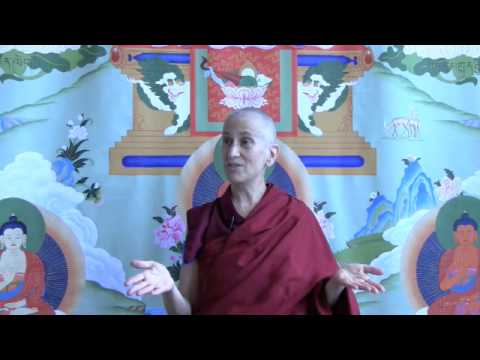Negating inherent existence
Negating inherent existence
Part of a series of Bodhisattva’s Breakfast Corner talks given during the Green Tara Winter Retreat from December 2009 to March 2010.
- Inherent existence does not equal existence
- Emptiness of inherent existence does not equal non-existence
- Something that is dependent is not inherently existent
Green Tara Retreat 20: Negating inherent existence does not mean nothing exists (download)
Yesterday I was saying that inherent existence is something that does not exist, but that objects appear to us to inherently exist. That [inherently existing] means exist from their own side, without depending on any other factors. When we negate inherent existence, we are not negating all existence; inherent existence does not equal existence. In the same way, emptiness or emptiness of inherent existence does not equal non-existence. When we’re negating inherent existence we aren’t saying things are non-existent.
It’s a very important point because otherwise you could go to the extreme of nihilism and say, “Oh well, emptiness means non-existence, so cause and effect doesn’t exist, karma doesn’t exist, the path to enlightenment doesn’t exist. So I can do anything I want because cause and effect doesn’t matter; there are no moral consequences to my actions.” That’s a very dangerous view. Emptiness does not mean that. If you think like that, then you’ve got the wrong view.
Dependent arising—they call it the king of reasonings, or queen of reasonings. Why? Dependent arising not only negates inherent existence, but it also establishes conventional existence. It does both things at the same time. How?
- Because if things are dependently arising, then they exist. Because arising dependently means things come together and they influence each other and they form something new, so they exist. And so that is establishing that things exist.
- By saying that they’re dependently arising, it’s establishing that they are not independently arising, and thus they are not inherently existent.
So it’s very helpful for us to reflect on how things are dependent and then take that to say, “Well, if they’re dependent then they’re not inherently existent, but they do exist.”
This is always where it’s always very tricky because our mind tends to equate existence with inherent existence, and emptiness with non-existence. Why? Because we don’t know it. We’re so used to inherent existence appearing to us, we can’t imagine any existence being other than that. So that’s why this fine line of negating inherent existence, and at the same time establishing cause and effect conventionally is such a fine, fine line. Because our mind just wants to grasp at something. If it doesn’t have something real to grasp at, then we just throw up our hands and say, “Well, there’s nothing whatsoever.” We have a very hard time finding the middle way with a grasping mind. This in response to the person who asked, “What is emptiness?” This is a little bit about it.
Venerable Thubten Chodron
Venerable Chodron emphasizes the practical application of Buddha’s teachings in our daily lives and is especially skilled at explaining them in ways easily understood and practiced by Westerners. She is well known for her warm, humorous, and lucid teachings. She was ordained as a Buddhist nun in 1977 by Kyabje Ling Rinpoche in Dharamsala, India, and in 1986 she received bhikshuni (full) ordination in Taiwan. Read her full bio.


